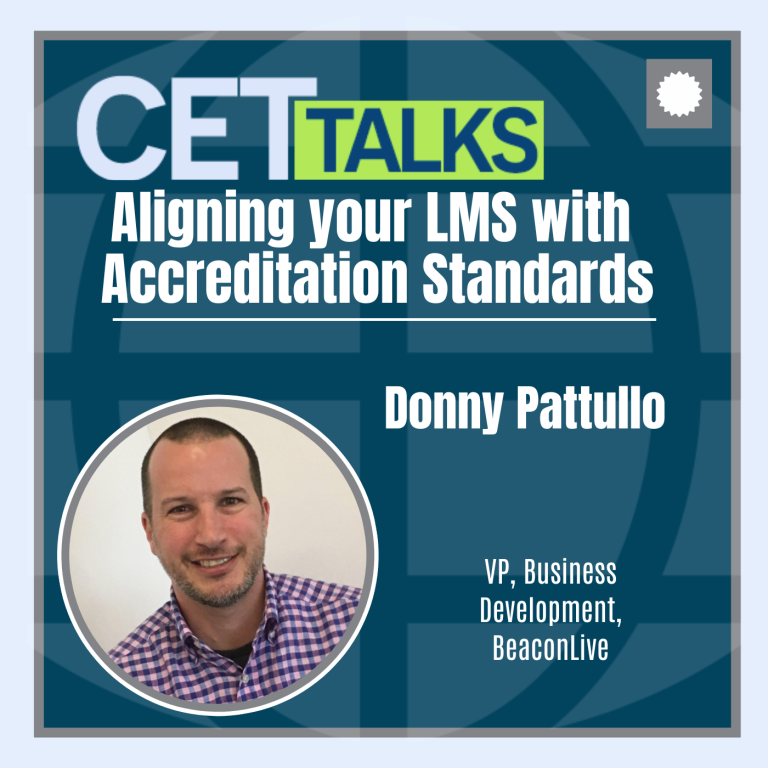Episode 05
.
CET Talks: Accreditation, Learning and Leadership
Episode 05
AUGUST 8 2023 . 28 MINUTES
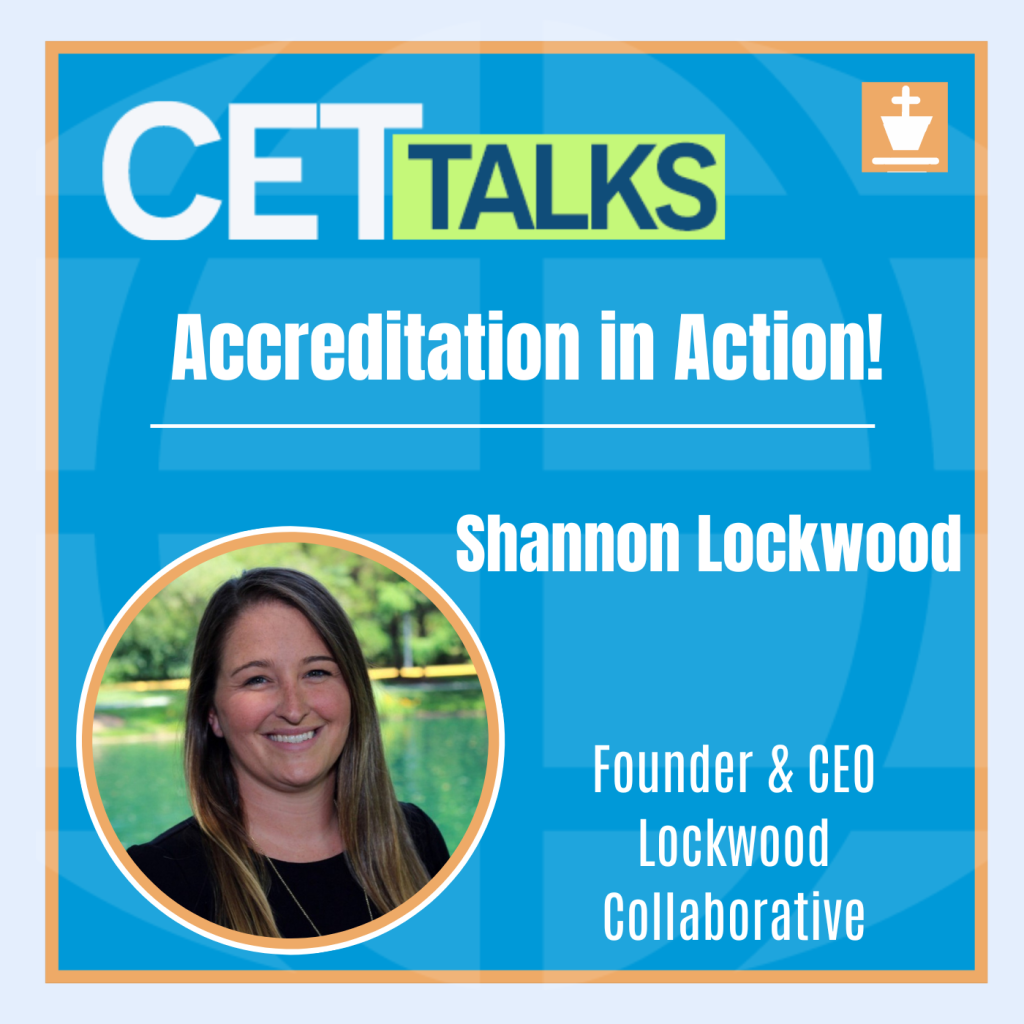
Accreditation in Action! The IACET 2023 Annual Conference
Randy Bowman, Interim President and CEO of IACET, is joined by Shannon Lockwood, Founder and CEO of Lockwood Collaborative and IACET’s event planner, to discuss IACET’s 2023 4th Annual Continuing Education and Training Conference. Shannon shares her journey into event planning, her unique philosophy in crafting experiences, and the challenges and triumphs she encountered while orchestrating this year’s conference. Shannon reveals how she fosters meaningful connections among attendees through strategic breaks, networking dinners, and cutting-edge tools like the Whova App. She also discusses the theme for this year’s conference (Accreditation in Action!) and shares her vision for a world that learns better through interconnected ideas and impactful events.
Listen to the Podcast
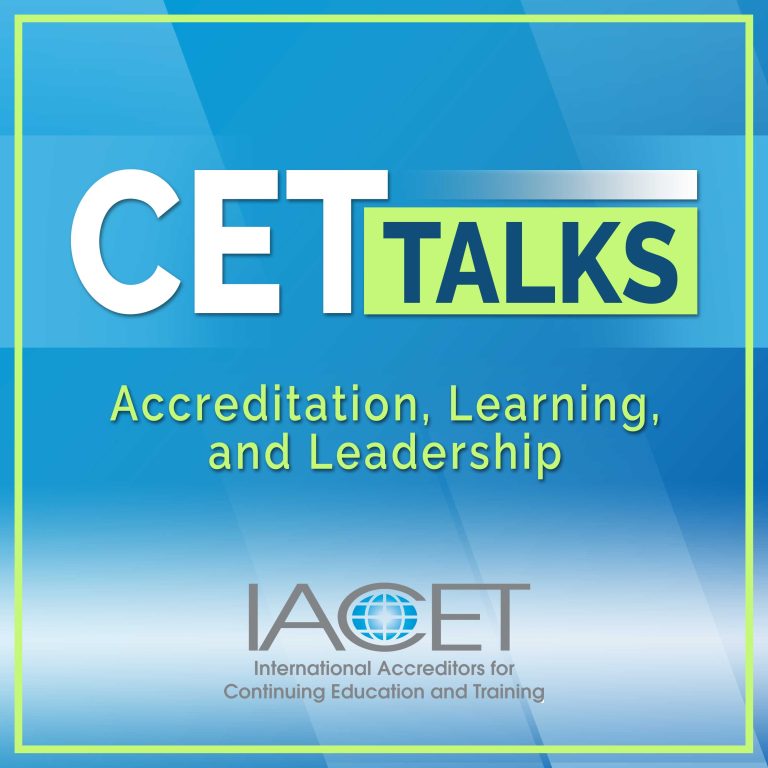
Welcome to CET Talks, the International Accreditors for Continuing Education and Training’s podcast, where we convene thought leaders in the continuing education and training ecosystem to share ideas, research, best practices, and experiences that promote the creation of a world that learns better. Your hosts are Randy Bowman, Interim President and CEO of IACET, and certified corporate wellness specialist Mike Veny.
Randy Bowman, Interim President and CEO of IACET, is joined by Shannon Lockwood, Founder and CEO of Lockwood Collaborative and IACET’s event planner, to discuss IACET’s 2023 4th Annual Continuing Education and Training Conference. Shannon shares her journey into event planning, her unique philosophy in crafting experiences, and the challenges and triumphs she encountered while orchestrating this year’s conference. Shannon reveals how she fosters meaningful connections among attendees through strategic breaks, networking dinners, and cutting-edge tools like the Whova App. She also discusses the theme for this year’s conference (Accreditation in Action!) and shares her vision for a world that learns better through interconnected ideas and impactful events.

Transcription
Host: Welcome to CET Talks, the International Accreditors for Continuing Education and Trainings podcast, where we convene thought leaders in the continuing education and training ecosystem to share ideas, research best practices, and experiences that promote the creation of a world that learns better. Enjoy the episode.
Randy Bowman: Hello, and welcome to today’s episode of CET Talks. My name is Randy Bowman, and today I’m flying solo, but I do have a special guest with me, Shannon Lockwood of Lockwood Collaborative. She’s the founder and CEO of that great company. She’s going to help us talk today about annual conferences and specifically IACET’s annual conferences, but also share with us some great ideas about conferencing, in general. Shannon has over 10 years in the meeting and events industry. She supports organizational missions of her clients through exceptionally executed trade shows, conferences, meetings, and events, some of which included the Democratic National Convention, a presidential inauguration, the Lions Club, Centennial Convention, and many more. Shannon has vast experience with in-person, hybrid, and virtual events, and that allows her to contribute to the strategic vision of organizations and deliver events that have great impact. Her professional experience includes roles in nonprofit associations, official service contractors and convention center sales and operations. She is a graduate of St. Mary’s College of Maryland and maintains IAEE’s Certified Exhibition Management, the event industry council certified meeting professional and PC MA’s, digital event strategist certifications. Wow, that’s a whole mouthful of acronyms. We’re just so glad you’re here. Shannon, why don’t you tell us a little bit about yourself, and how did you ever get into event planning to begin with?
Shannon Lockwood: Hi, Randy. I just want to thank you so much for having me on the podcast this afternoon. For me, events was a sort of a lifelong calling. I grew up in a large family that traveled a ton, as my dad and his team, and my mom would race sailboats all over the country. I grew up going all over the place with my siblings, participating in regattas and different events. Coming from a large family on both sides, our holiday gatherings were always huge. I took the initiative to plan Thanksgiving at 12 and volun-told my parents that we were hosting.
Randy Bowman: Oh – wow. That’s great.
Shannon Lockwood: I called all of my aunts and uncles and delegated all of their usually brought potluck dishes to the table, told my parents how many people we needed to seat, and where and how we were going to arrange that in their house. So, it was something that came quite naturally. As I got older and went to college, I actually professionally organized events at my university. My first professional role was with the Baltimore Convention Center, and it’s just exploded from there. I’ve had the great privilege to work for a number of awesome organizations, two convention centers, Hargrove, which is an official service contractor well known for doing every inauguration since President Truman, and many other events with nonprofits and government organizations. It’s really been a privilege. But that is my story. I think what I’m excited to see is what’s next, as Lockwood Collaborative was started in November of 2021, after the pandemic. The organization I was with had done virtual events in person. We’d returned to live and hybrid, and I was looking for something a little different, a little more variety. Being out and independent as a sole proprietor has been a really great privilege to serve so many awesome organizations, including IACET.
Randy Bowman: I know we’re certainly glad to have you. Our conference is probably a little bit smaller than the presidential inauguration, indeed. But planning events of all different sizes for all kinds of different organizations has to be really challenging. What is your philosophy, or maybe your approach, to ensuring that you are the right fit for the organization, and what made planning this event for IACET different than some of the others you’ve done?
Shannon Lockwood: Great question. I think being the right fit for an organization comes down to timing and availability. I have had such a wide swath of experiences for planning board meetings for 25 people all the way up to the Centennial Convention for 35,000. For me, the size is not the issue. It’s about connecting with excellent people, such as yourself, having a really great work environment, having good rapport and communication amongst team members, which is something that I really pride myself on. Making sure that I create a collaborative environment, that’s a huge part of the name of the business and one of the things that I like to implement. I think that’s really important for all organizations, and this transcends even events, because I know instructional designers and training professionals use this statement, as well. The entire idea is designed with the end in mind. What do you want folks to get out of this experience, this course, this educational opportunity? All of us are working very similarly to get our participants to some logical conclusion at the end of our event or training activity. I feel an affinity for training professionals and instructional designers because they do a lot of the same work that events professionals do, albeit with a different end product. I think one of the unique things and challenges of this project for me was that while we were definitely out ahead of the event in terms of planning timeline, I definitely felt like I arrived mid cycle. Right? Right. There had been so many decisions that were already made and already set in stone that we were doing the work to create a plan of how to execute something that was already half built. I think for me, sometimes that is a really unique challenge, because I might have suggested something different or something larger or smaller depending on what the goal of the event was. I think some of those conversations had already been decided upon. For me, it was about learning what those things were. How did all those decisions come together, and what is the focus? Most of the time when I start an event, I get to start with, what are we building? What is the thing we’re trying to do, and how do we get there? How do we design with the end in mind? I think for me on this IACET event, it was much more about, okay, Shannon, get with the program and how do you learn what the end in mind is? I think that was the unique challenge for this group. But really glad to be part of the team and looking forward to a successful event next month.
Randy Bowman: Thank you. So are we. And we do appreciate you rolling up your sleeves and jumping right on in and accepting the challenge. Planning an event on any scale, whether small or large, involves a significant amount of coordination. What are some of the challenges that you usually face during that planning process? How do you overcome them and what kind of tools do you find best suited for organizing a project like this?
Shannon Lockwood: Excellent. I think for me, for coordinating and making sure the left hand’s, talking to the right hand, and the left foot’s talking to the right foot, to make sure that we’re all dancing in the same direction, is a huge part of the challenge in all organizations, with all levels of stakeholders. You may have individuals from the board, the C-suite, the marketing team, who are all involved in making sure that this event goes off with the vision that the organization has in mind. As long as everyone in that organization has the same vision, that’s usually a relatively easy task. But if all of those folks don’t get on a call regularly or at all, that may present some challenges for communicating what the vision, and then what the execution is going to look like. For me, one of the things that I really like to implement is a cadence of meetings. Whether that’s weekly, biweekly, monthly, depending on typically how far away the event is. That is a useful tool to get all the stakeholders in the same place and is a staple of all of my client projects, making sure that I have time on the calendar to talk to everybody on a regular cadence in terms of pulling those stakeholders together and executing the list of tasks. I think one of the biggest parts of those meetings is talking about the milestones. What are the big things we’re working toward? What are the big deadlines approaching? A good way to keep track of them is using some sort of project management software. There are tons out there. Everybody has their personal favorite. I think I’m using five currently across different clients. It’s always what fits the organization, what works for them, what they’re already using, collaborating on a platform that everyone’s willing to use is a huge part of that shared language of the event. And making sure that everyone has access to all the information they need. IACET was able to implement Smartsheets for us this year, which I’m immensely grateful for. I think that has helped us to automate reminders and keep folks on task for things that are coming up that are due from them, as well as a sort of global list of reminders for all of us about what others are working on and how we can reach out and support them and say, Hey, I’ve got some extra time. How can I help you get that done this week? And make sure that we’re still on track to achieve our goal.
Randy Bowman: Wow. Five different project management tools.
Shannon Lockwood: It’s definitely a challenge.
Randy Bowman: You may have a future in software consulting and helping people choose the right project management tool for you.
Shannon Lockwood: It’s a good idea. Yeah.
Randy Bowman: Yeah. Can you tell us a little bit about the overall theme and objectives of the fourth annual continuing education and training conference that’s coming up next month in September of 2023?
Shannon Lockwood: I can. IACET’s theme this year is “Accreditation in Action.” Continuing education and training professionals are going to get together and talk about the trends and best practices within the field and see how industry professionals are using them in real time. We’re looking forward to learning from thought leaders on the value of accreditation, and we have tracks that span continuing education and training, talent development, as well as an Energy and Workforce summit on day one and day two, respectively.
Randy Bowman: Wow. And that sounds like a whole lot. The success of any conference, you know, largely depends on the choice of speakers and sessions. Who can we expect to hear from this year?
Shannon Lockwood: Our opening keynote is Dr. Beasley, president and CEO of Leave a Life Print. Her work focuses on sustainable change and effective implementation of innovation. I’m particularly excited to hear what she has to say, especially as we just talked about project management tools. It sounds like she can give me some advice on how to streamline some of them. We also hear from Diane Elkins, owner of Artisan e-Learning in our closing keynote. In each of the tracks, we have some great speakers. In the continuing education and training track, Dr. Barbara Prim and Rowell Mariano will discuss how to use Bloom’s Taxonomy to break down the generational silos of groups of learners and build bridges between them within a single learning event. In the talent development track, we’ll hear from representatives of the United Arab Emirates Ministry of Interior, who will discuss how standards-based and accredited training allows them to develop a workforce that maintains the highest levels of safety and security in the UAE’S major cities. Then the Energy Summit will focus on the future of learning and development, transformative technologies and tools that advance capacity building within the energy sector, specifically. The Energy Summit will be on Wednesday, September 13th, and then on Thursday, September 14th, the Workforce Summit sessions will focus on supporting adult learners and improving their skills and abilities through training, coaching, and mentoring.
Randy Bowman: That’s a lot. I know. I’m really excited about those particular sessions, as well. And so many more. Obviously, we don’t have time to go through and talk about how exciting each and every one of them are. Thank you for giving us some of those highlights. A lot of people come to conferences for networking, to meet other people and share ideas. What are some of the strategies to facilitate meaningful interactions among the attendees this year?
Shannon Lockwood: You’re absolutely right. Folks, come to conferences for networking. It’s often the most highly rated survey response. Why did you come? It was to connect with others. And one thing we know about adult learners in events, regardless of whether they’re in person or hybrid or virtual, is they need breaks. The schedule builds in those breaks. That may be to connect with sponsors and exhibitors. It also may be to dissect a session with fellow attendees and take the time to expand upon the learning they had in those session rooms. The schedule this year allows for those networking breaks and opportunities to discuss the content and digest all of that information you’re taking. In addition to networking breaks throughout the program, we will also host the awards dinner on Wednesday evening. This will be a great opportunity for everyone to learn about the fabulous work some of our colleagues have been doing in the continuing education and training space and provide further opportunities to continue discussing the topics of the day, as well as building new relationships. Finally, the WHOVA app will actually allow attendees to connect even in advance of the conference. There will be some topical discussions and message boards that will occur beginning this month. We’ll also have the opportunity to connect with other attendees, learn about the speakers and sessions, and access presentations and exhibitor profiles. A one-stop shop to get everything you need for the conference. So, we’ll look forward to having everybody engage with that app as we get closer to the event.
Randy Bowman: Yes, I love the Whova app. We had a really great time with it at last year’s conference. A lot of great engagement happened before the conference, during the conference, and even after the conference through that platform. Are there any special workshops that participants can get involved in?
Shannon Lockwood: Yes. This year’s event is particularly unique because it will feature a special panel discussing the forthcoming IACET 2023 Standard, which will be published later this year. The discussion is scheduled for Day Two, and we’ll give participants a preview of the anticipated updates for 2023 and beyond.
Randy Bowman: I happen to know people’s insider info is coming. The panel is comprised of the people who wrote the Standard, and you’re going to get a chance to ask them any question you want and hear straight from the people who designed it, what something means. Special treats.
Shannon Lockwood: A great opportunity
Randy Bowman: It is. That’s not something you can do anywhere, any day.
Shannon Lockwood: Never. Definitely not.
Randy Bowman: So speaking of anywhere, where is this conference? What are some of the unique features of the venue that attendees will appreciate?
Shannon Lockwood: Oh, I’m so excited about this. I love St. Louis, Missouri. I’m thrilled that the conference will be there this year. The event is being hosted at the Royal Sonesta Chase Park Plaza, which is a beautiful property, where all of the rooms are suites. They are available at IACET’s group rate of $175 a night, which I haven’t seen a group rate that low in ages. So, a great price point to enjoy a beautiful hotel with suites. As I mentioned, there’s a movie theater inside the hotel. It’s walking distance from the incredible restaurants in the Central West End District, as well as being directly across the street from the beautiful Forest Park. Forest Park, if you’re unfamiliar with St. Louis, is home to five cultural institutions, including the St. Louis Art Museum, the St. Louis Science Center, and the St. Louis Zoo. The beautiful thing about these attractions is that all of them are free. Everything is accessible to you as an attendee. If you haven’t been to St Louis or visited the city before, I absolutely encourage you to go back to the hotel and change your reservation and extend your stay a couple of days and really enjoy this beautiful city. Take advantage of the free entertainment that’s available to you there.
Randy Bowman: Oh, definitely. St. Louis is close to my heart, as well. My parents live there, and I have visited all of those places numerous times and many more. You are exactly right. They are world class institutions. You won’t be disappointed taking some time to visit them.
Shannon Lockwood: Absolutely.
Randy Bowman: Training providers who may be listening, many of them have planned conferences, meetings, and other type of learning events. What advice do you have for them?
Shannon Lockwood: Well, Randy, when I was thinking about this question, I couldn’t decide if this advice was for them or for me. But I think that for me, many folks are asked to add event magician to the top of their list of skills. It may be in addition to their instructional design work or their marketing work and whether they be in continuing education, nonprofits, government, we’re all being asked to do more with less. And so the biggest thing I want to encourage everybody to do is ask for help. There are many organizations and individuals like myself where you can add folks to your list of trusted team members, but you also could just call and ask to walk through a challenge or an idea. One of the things that I have found since going to work independently is that often I don’t have that water cooler to shake out an idea and think through the best opportunity for us. What I have found is that the events industry is a collaborative and helpful bunch of people, whether it’s MPI, PCMA, IEE, or ASAE. All of these organizations provide resources to individuals who are planning events. Many of them, whether you’re a member or not. Everyone within those organizations is willing to lend suggestions, contact information, and ideas to anyone who is planning an event or program, learning activity, and is looking to build that program. So, don’t hesitate to reach out to folks that you see on LinkedIn. There are so many wonderful creators and influencers that do work on LinkedIn, specifically in the event space. Certainly, you can always reach out to me, but I think there are many folks who are willing to answer your questions and may be really focused on exactly the problem you have. So don’t hesitate to ask for help, and to reach out.
Randy Bowman: If you are a listener and do want to contact Shannon, by all means drop me an email, and I’ll be happy to connect you to her, as well. She has been a marvelous asset to us in this planning, and I would highly recommend anyone who needs to plan an event and needs some services. Shannon can certainly help you.
Shannon Lockwood: Thank you, Randy.
Randy Bowman: Tell me, how do we measure success in the event space? What makes an event successful?
Shannon Lockwood: I think for me, that word ‘successful’ always comes back to, what did you set out to do? What was the design with the end in mind’s goal? While that can be unique for every organization, regardless of what industry or purpose they serve, the thing that always ties me back together with every event is connection. We build good events, build spaces, and provide the arena for events to happen, where individuals are supported, they’re well fed, they’re not too hot or too cold, they’re not overwhelmed by the pace of activities. They’re given space to be their best selves and can collaborate with others who are at their best. By creating this space for individuals and by creating quality events that allow people to get their brain turning, you allow them to bring their best ideas, their best selves. We really improve our industries, our organizations, and by consequence, the world, and working with others and doing events that share the same goal. So for me, it’s about building the connection by allowing folks to be their best selves.
Randy Bowman: That sounds great. Sounds great. Earlier you mentioned that you love to sail, and I know it doesn’t have anything to do with events, but what’s the most enjoyable part of sailing?
Shannon Lockwood: It’s funny that you say it doesn’t have anything to do with events, because it almost exclusively is event based. We organize things to get everybody to do it on a specific day at a specific time in a specific city. So it feeds my little event heart for sure, to sail and participate in regattas. I think the thing for me, sailing is very multifaceted, and the way that I most often engage with it is racing. It’s so many conflicting things at the same time. It’s relaxing, it’s competitive, it’s meditative. It gives me an opportunity to be in nature. But I think the one thing I land on is I get to do it with people I love. My dad and I have been sailing together for 15 years. We bought a boat together when I was in college and have been sailing that same boat ever since. My partner joined the team a few years ago. We did the World Championships last fall in Newport, Rhode Island, which was an incredible opportunity. And getting to spend time with folks outside of my hectic event schedule is a real treat.
Randy Bowman: That sounds awesome. It’s always great to have those connections. So, we always ask this question of all of our guests, what does a world that learns better look like to you?
Shannon Lockwood: I love this question. I think it goes back to what I think success at events looks like. I really think that a world that learns better is one that connects individuals and brings them into spaces for elevated thinking and creative ideas, that allow us to solve the world’s biggest challenges.
Randy Bowman: Hmm, that’s beautiful. That’s beautiful. Shannon, thank you so much for being here today and engaging with us. And giving us a lot of insight on, not just IACET’s event, which is great, but on event planning and events in general. I had two takeaways. I usually only have one, but I had two takeaways today. One is designing with the end in mind, that idea that before you even start planning your event, your conference, sitting down and making sure you know what it is you want to do. The other one was, I love the idea of ensuring that you create a space for people to be their best selves. Those two things as part of event planning are what I’m going to take away, design with the end in mind and make sure that event creates space for people to be their best selves. Thank you so much.
Shannon Lockwood: Thank you, Randy. It was a pleasure to be here today.
Randy Bowman: For all of our listeners, I do hope you found this podcast to be encouraging and you take took something away as well. We do want to encourage you to come to our 2023 annual conference happening September 13th and 14th at the Royal Sonesta Chase Park Plaza in St. Louis, Missouri. Shannon will be there, I will be there, and Mike will be there, too. You can find more information about how to register on the website at www.IACET.org. Make sure you come and tell Mike and I that you heard about it on the podcast. As we head out today, I want to ask our listeners, tell us about the most impactful conference session you ever attended, the one that changed your worldview in an impactful way. Would love to have you find us on LinkedIn and twitter at IACET.org and share your vision. Don’t forget, you can submit topic ideas, suggestions for guests, and other feedback on the CET Talks podcast page on the IACET.org website. We certainly hope you’ll subscribe to this podcast on your favorite podcast platform, so you don’t miss any episodes. Thank you so much for joining us today.
Host: You’ve been listening to CET Talks, the official podcast of IACET. Don’t forget to subscribe to the podcast on Spotify, Apple podcast, or wherever you listen to podcast. To learn more about IACET visit IACET.org. That’s I-A-C-E-T.org Thanks for listening, and we’ll be back soon with a new episode.
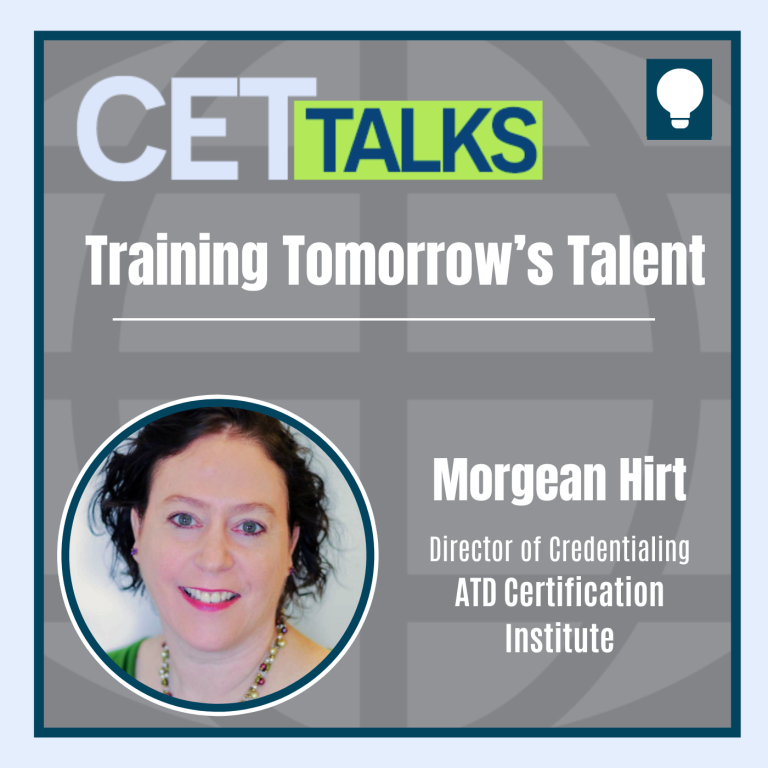
Episode 31: Training Tomorrow’s Talent: Exploring Certification, Standards, and Impact with ATD’s Certification Institute
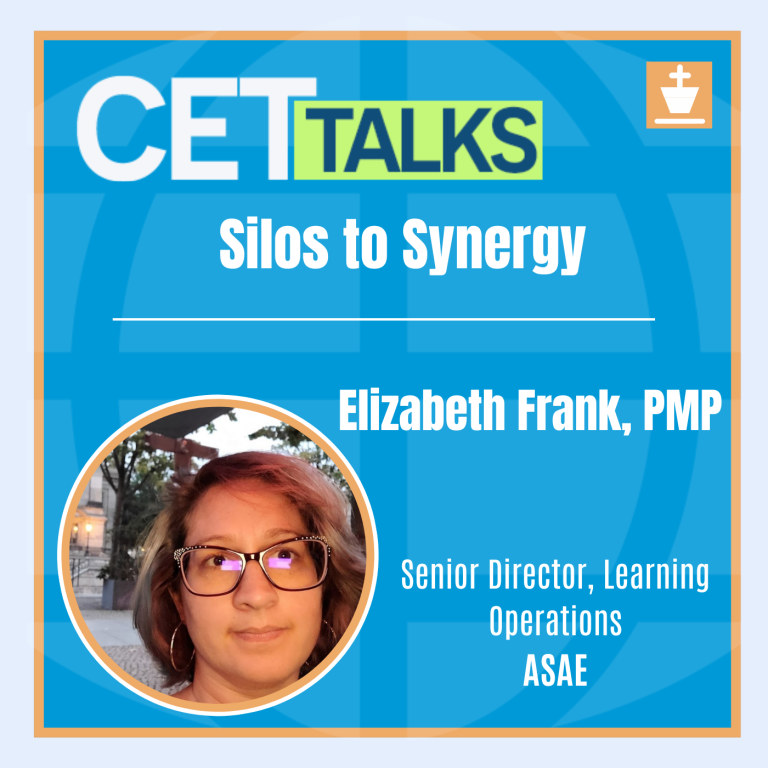
Episode 30: Silos to Synergy: Holistic Approaches to Creating Collaborative Learning

Episode 29: Credentials in Crisis: Challenges and Opportunities in Modern Education Recognition
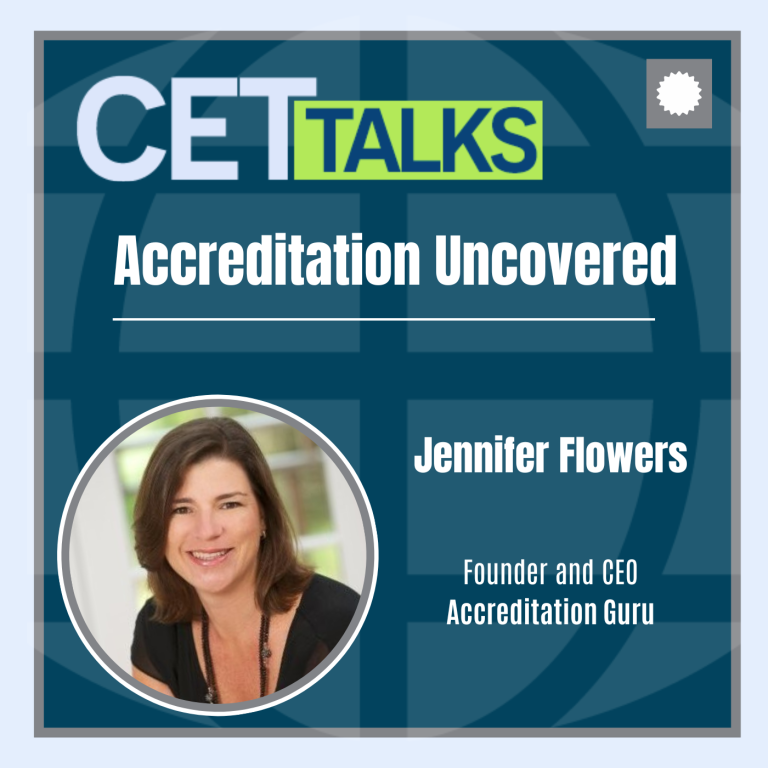
Episode 28: Accreditation Uncovered: Essential Insights from an Industry Leader
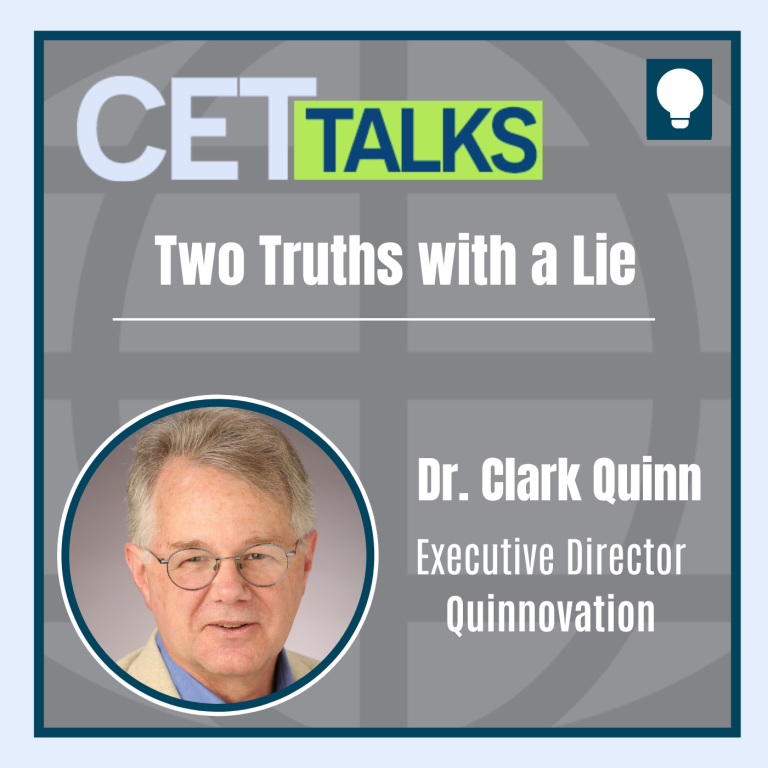
Episode 27: Two Truths with a Lie: Managing the Myths of Modern-Day Learning
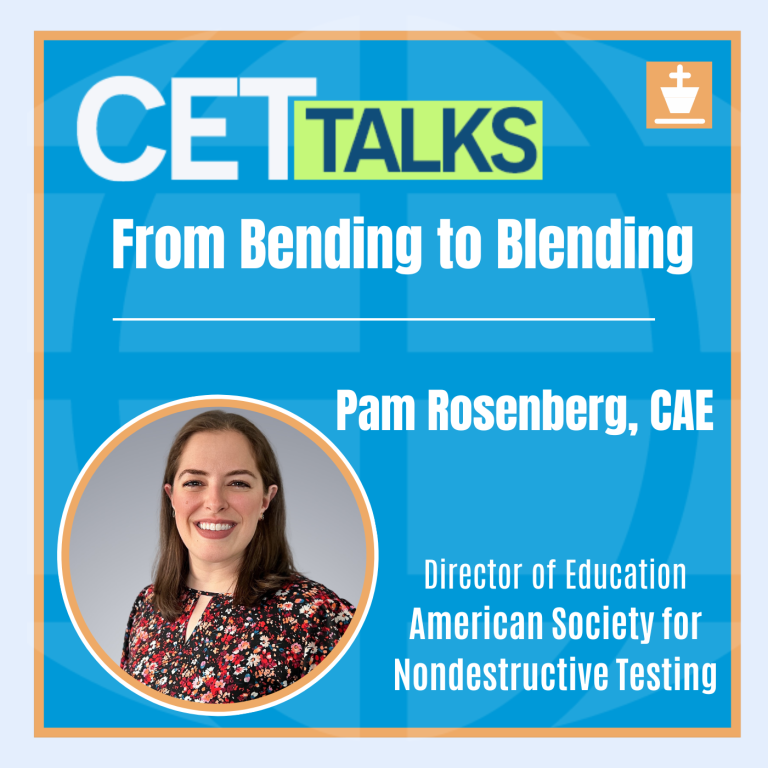
Episode 26: From Bending to Blending: Best Practices in Integrating Externally-Created Content
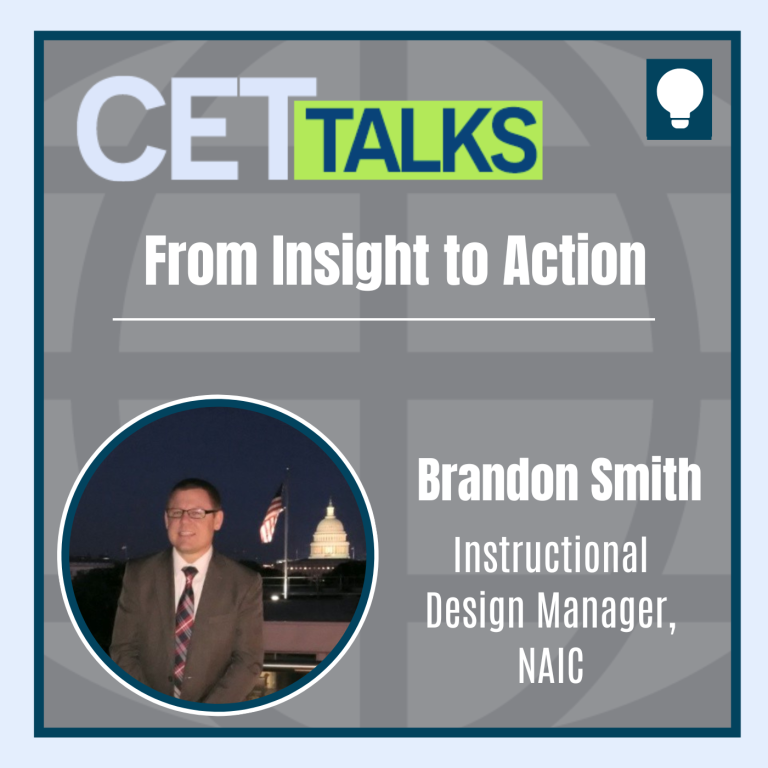
Episode 25: From Insight to Action: Charting the Career Path of a SME-turned-ISD
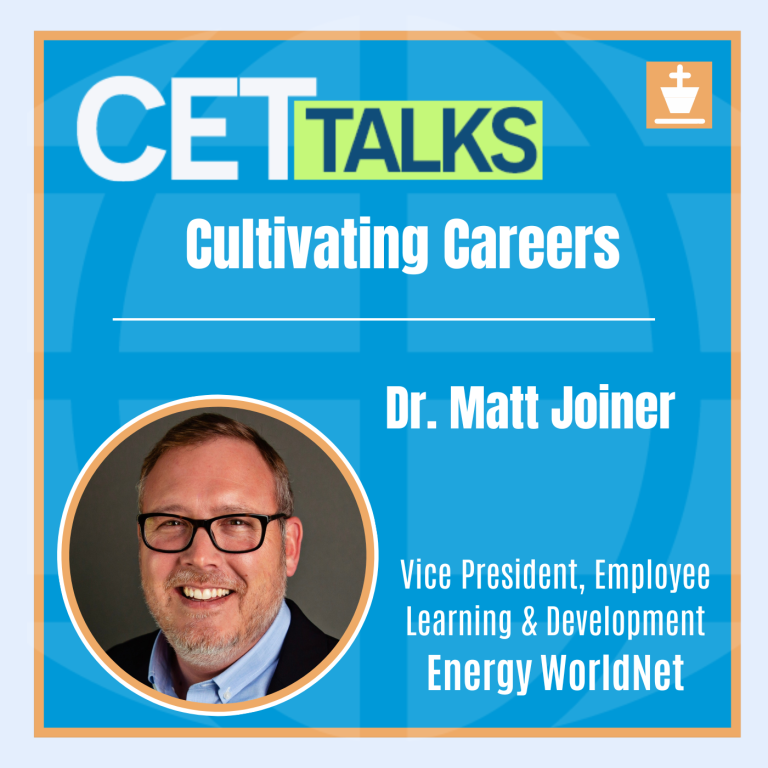
Episode 24: Cultivating Careers: The Power of Employee Engagement for Organizational Success
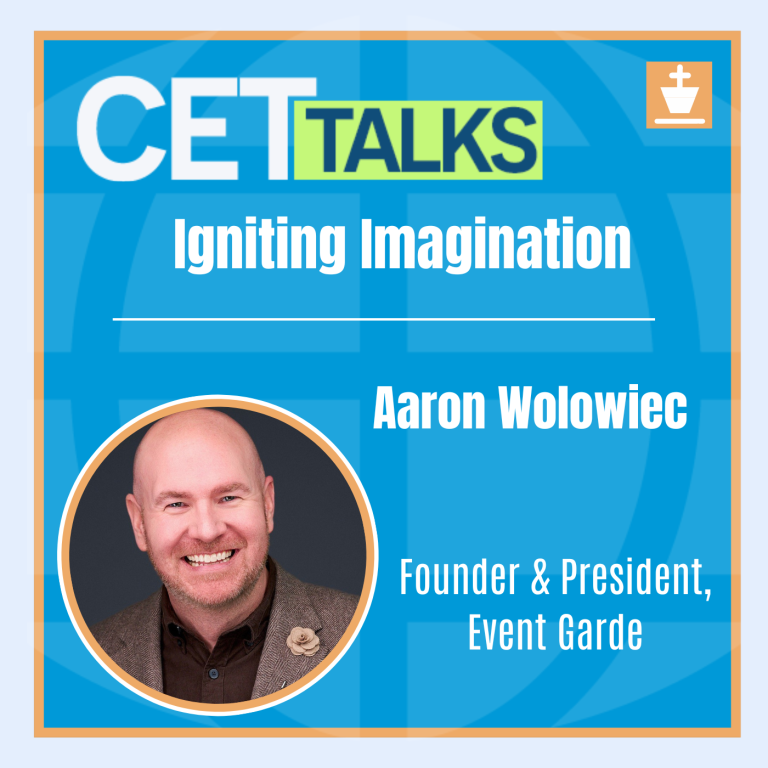
Episode 23: Igniting Imagination: Crafting Creativity in Training Environments
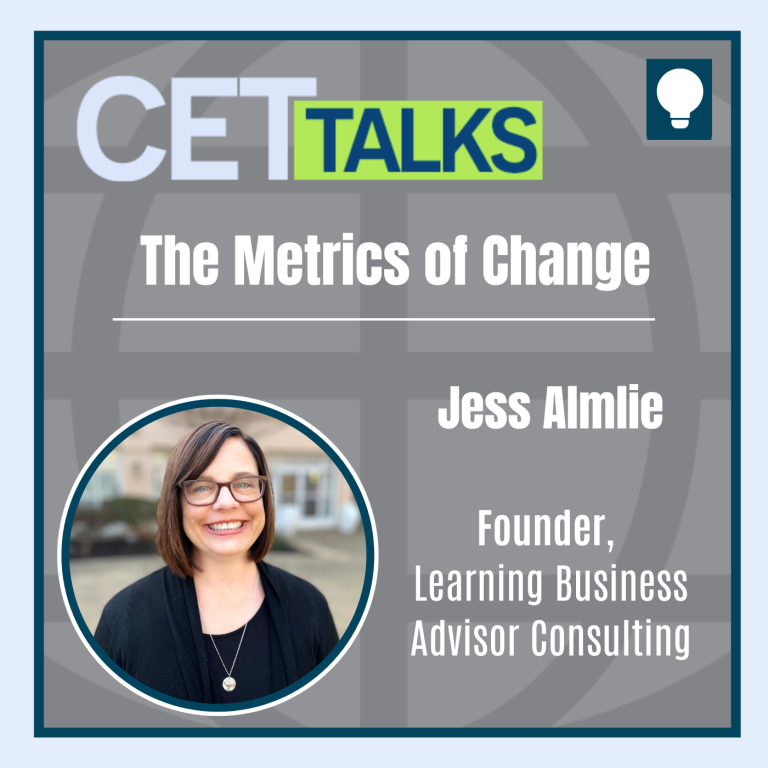
Episode 22: The Metrics of Change: Navigating Purposeful Measurement in L&D
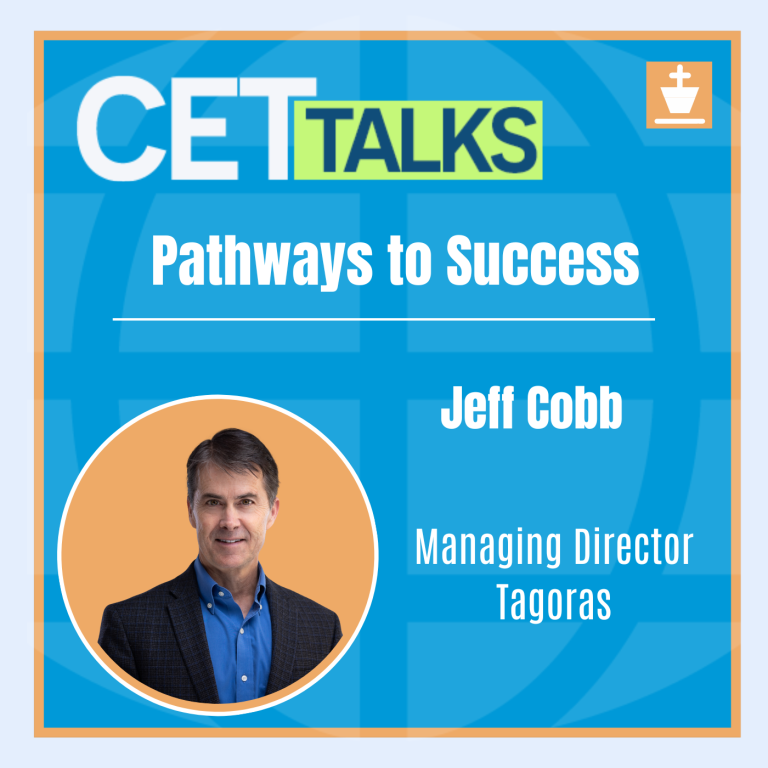
Episode 21: Pathways to Success: The Value of Lifelong Learning through Digital Credentials
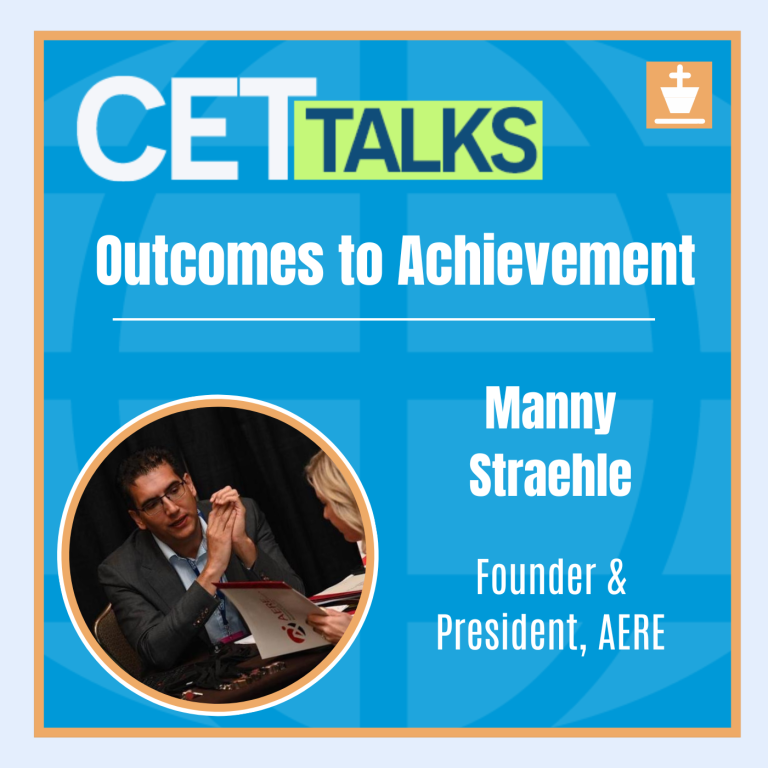
Episode 20: Outcomes to Achievement: Crafting Tomorrow’s Workforce Through Competency Models
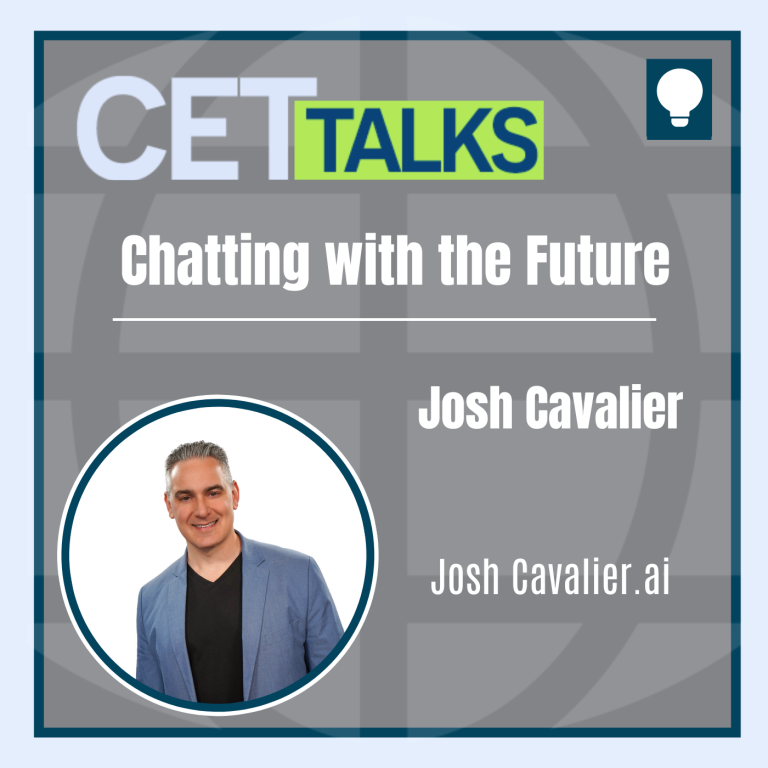
Episode 19: Chatting with the Future: Enhancing AI Output Through Prompt Engineering
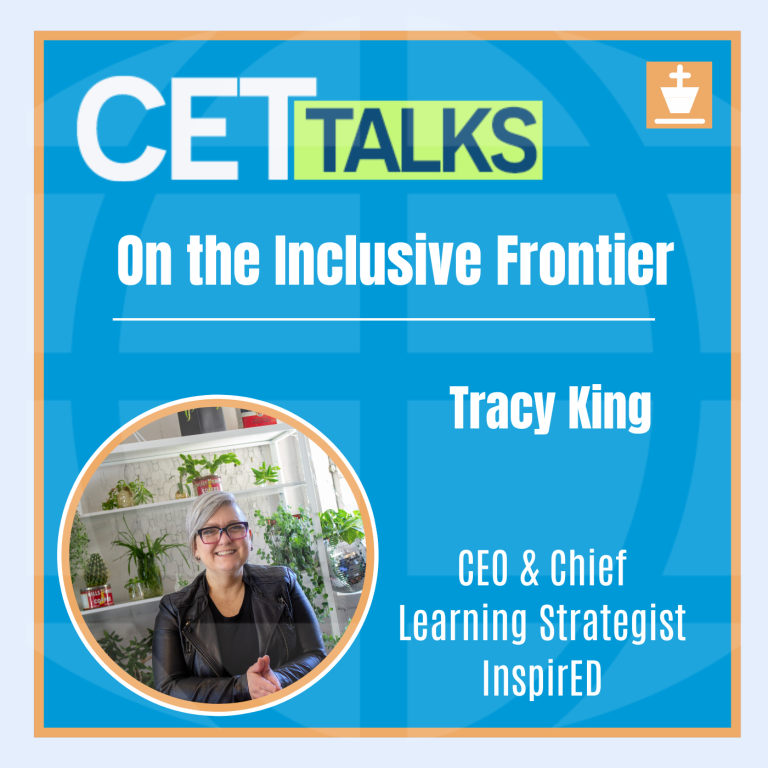
Episode 18: On the Inclusive Frontier: Harnessing Neurodivergence in Modern Training

Episode 17: Designing with Purpose: Strategies for Accessible e-Learning Development
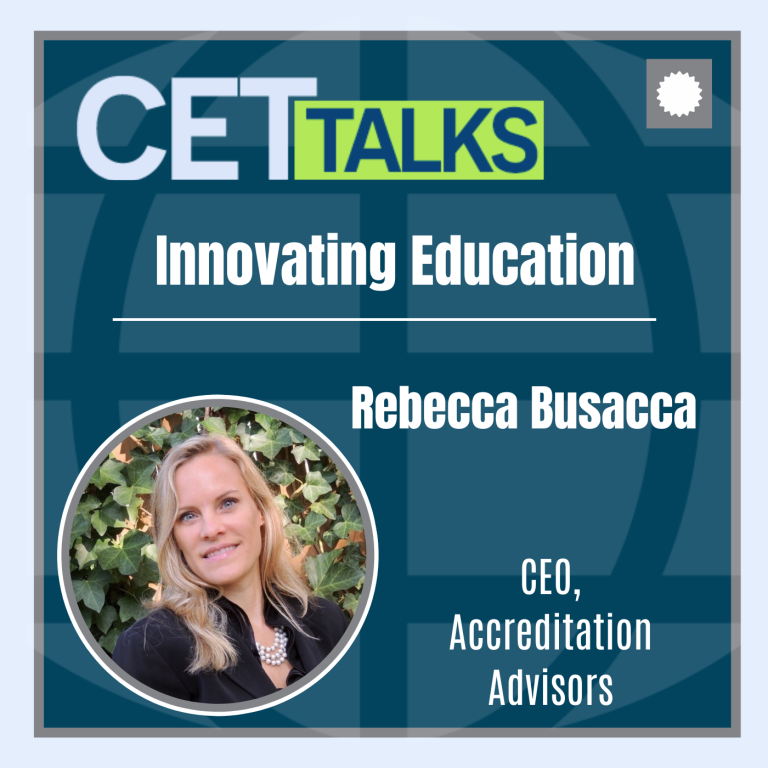
Episode 16: Innovating Education: Navigating Accreditation for Short-Term Training
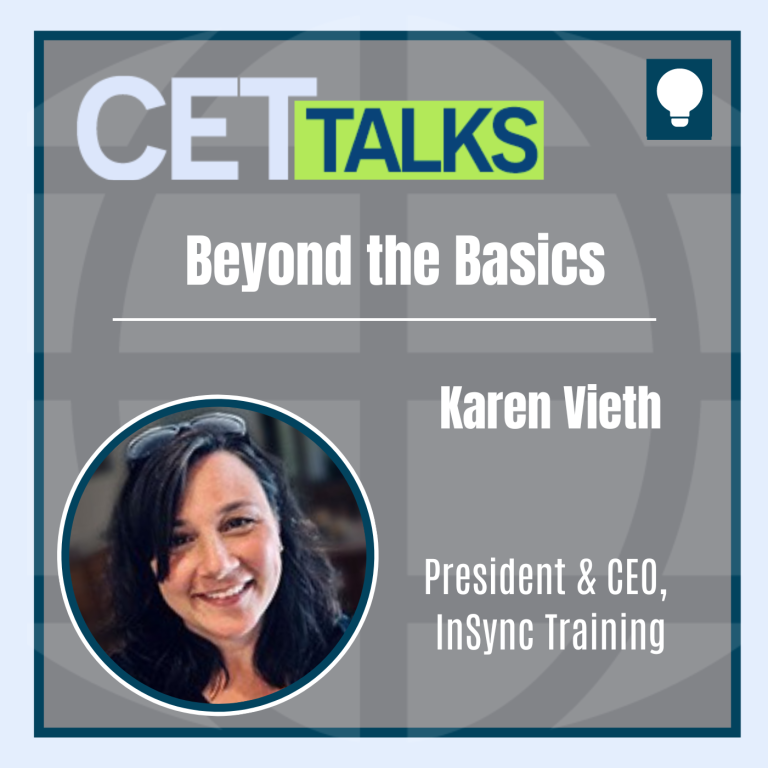
Episode 15: Beyond the Basics: Elevating Virtual Training through Expert Facilitation
